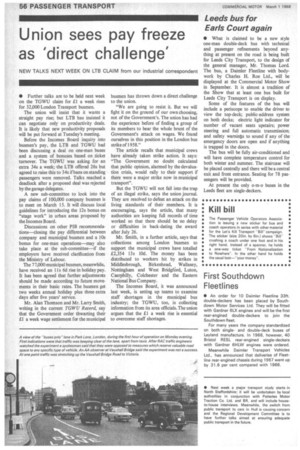Union sees pay freeze as 'direct challenge'
Page 58

If you've noticed an error in this article please click here to report it so we can fix it.
NEW TALKS NEXT WEEK ON LTB CLAIM from our industrial correspondent • Further talks are to be held next week on the TGWU claim for £1 a week rises for 32,000 London Transport busmen.
The union will insist that it wants a straight pay rise; but LTB has insisted it can negotiate only on productivity deals. It is likely that new productivity proposals will be put forward at Tuesday's meeting.
Before the Incomes Board inquiry into busmen's pay, the LTB and TGWU had been discussing a deal on one-man buses and a system of bonuses based on ticket turnover. The TGWU was asking for an extra 34s a week; -the un3 offered 26s but agreed to raise this to 34s if bans on standing passengers were removed. Talks reached a deadlock after a proposed deal was rejected by the garage delegates.
A new sub-committee to look into the pay claims of 100,000 company busmen is to meet on March 15. It will discuss local guidelines for introducing the 12s bonus on "stage work" in urban areas proposed by the Incomes Board.
Discussions on other PIB reconunendations—closing the pay differential between company and municipal busmen and a lOs bonus for one-man operations—may also take place at the sub-committee—if the employers have received clarification from the Ministry of Labour.
The 77,000 municipal busmen, meanwhile, have received an lls 6d rise in holiday pay. It has been agreed that further adjustments should be made according to future movements in their basic rates. The busmen get two weeks annual holiday plus three extra days after five years' service.
Mr. Alan Thomson and Mr. Larry Smith, writing in the current TGWU Record, say that the Government order thwarting their LI a week wage settlement for the municipal
busmen has thrown down a direct challenge to the union.
"We are going to resist it. But we will fight it on the ground of our own choosing, not of the Government's. The union has had the experience before of finding a group of its members to bear the whole brunt of the Government's attack on wages. We found ourselves in this position in the London bus strike of 1958."
The article recalls that municipal crews have already taken strike action. It says: "The Government no doubt calculated that public opinion, alarmed by the devaluation crisis, would rally to their support if there were a major strike now in municipal transport".
But the TGWU will not fall into the trap of an illegal strike, says the union journal. They are resolved to defeat an attack on the living standards of their members. It is encouraging, says the article, that many authorities are keeping full records of time worked so that there should be no delay or difficulties in back-dating the award after July 26.
Mr. Smith, in a further article, says that collections among London busmen to support the municipal crews have totalled £2,354 13s 10d. The money has been distributed to workers hit by strikes in Middlesbrough, Birkenhead,Wallasey, Nottingham and West Bridgfo-rd, Luton, Caerphilly, Colchester and the Eastern National Bus Company.
The Incomes Board, it was announced last week, is setting up teams to examine staff shortages in the municipal bus industry; the TGWU, too, is collecting information from its area officials. The union argues that the £1 a week rise is essential to overcome staff shortages.








































































































































































